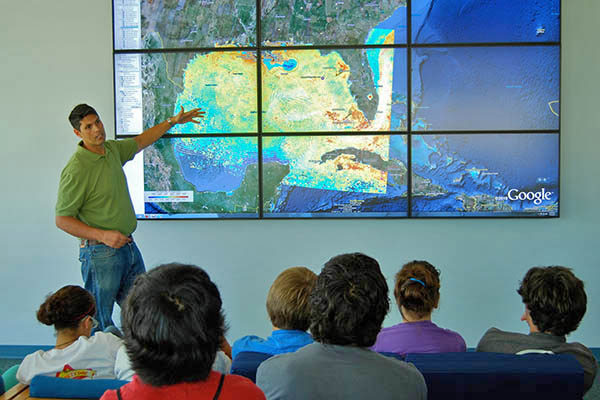
Marine science tours
Schools offered free marine science field trips at UD's Lewes campus
8:51 a.m., Feb. 13, 2013--Middle and high school classes can explore cutting-edge ocean science at the University of Delaware’s Hugh R. Sharp Campus in Lewes, Del., this spring. The College of Earth, Ocean, and Environment (CEOE) housed there is offering free guided tours of its world-class research facility to schools throughout the region.
Knowledgeable docents lead the tours, which start with an introductory video about the many ways CEOE researchers are studying wind energy, invasive species, pollution and other important environmental topics.
Campus Stories
From graduates, faculty
Doctoral hooding
Students walk through laboratory buildings where CEOE and Delaware Sea Grant College Program scientists conduct experiments and research. Exhibits explain marine environments such as the frigid, ice-covered seas of the Antarctic and the super-heated hydrothermal vents found more than a mile below the sea surface. Students also learn how scientists are working to address local issues, such as the impacts of land development on Delaware water quality and wildlife.
The Global Visualization Lab is often available to touring groups, demonstrating how scientists use Google Earth, satellites, surface monitors and underwater robots to study the ocean environment. Students also have the opportunity to view and learn about the University’s 2-megawatt wind turbine, which powers campus buildings and serves as a research base for wind energy development.
Another stop on the tour features aquariums containing habitats and marine life found in Delaware Bay. Tours also visit a large greenhouse where scientists are investigating salt marsh plants that can withstand rising sea levels and filter land-based pollution before it enters waterways.
Docents are mindful of educators’ needs to align student field experiences with grade-appropriate science standards and are prepared to customize the tours accordingly. Tours can also be supplemented with educational activities on wind energy, marine careers, the marine food web and other topics.
The free tours may be scheduled for classes of five or more people, Monday through Friday, between 10 a.m. and 3 p.m. Requests should be made at least one week in advance by calling 302-645-4234, by emailing Lisa Dorey at dorey@udel.edu, or by writing to the Delaware Sea Grant College Program, University of Delaware, CEOE, 700 Pilottown Road, Lewes, DE 19958-1298. The Hugh R. Sharp Campus is accessible to people with disabilities.
Article by Teresa Messmore
Photo by Lisa Tossey








